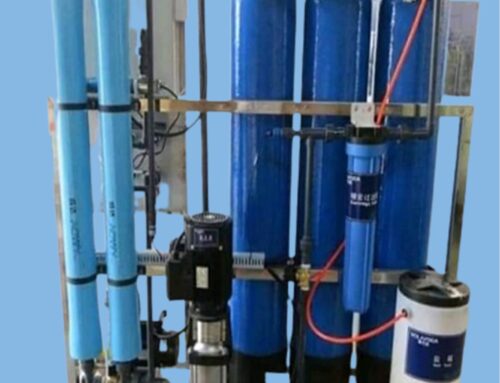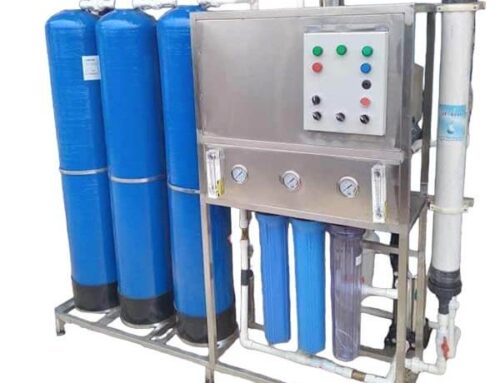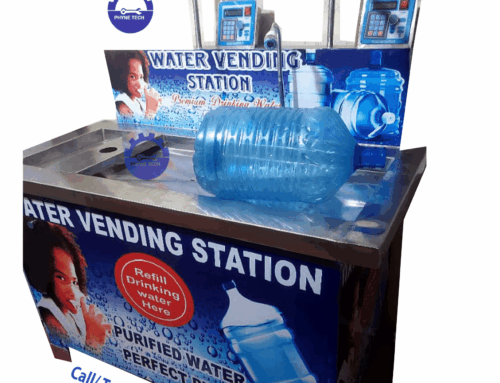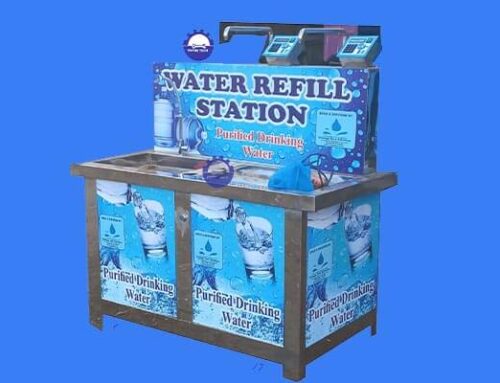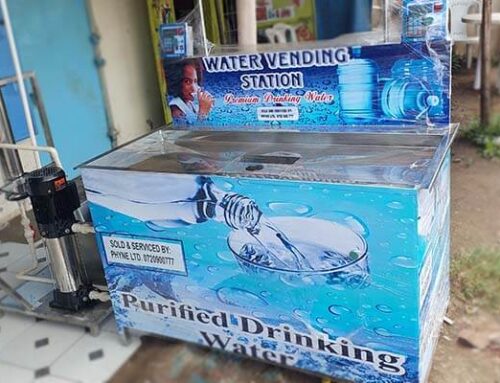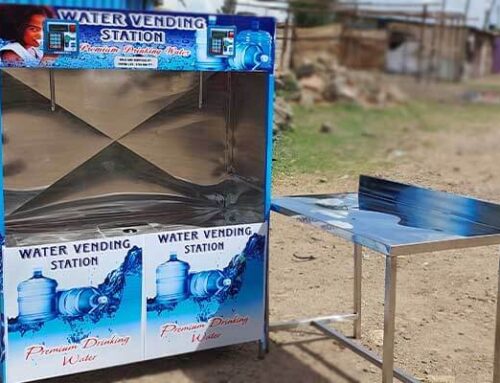A Guide to Starting Your Own Water Treatment and Vending Business in Kenya (White Paper)
Executive Summary
This white paper that we have titled “A guide to starting your own water treatment and vending business in Kenya”, provides a comprehensive guide for entrepreneurs interested in establishing a water treatment and vending business in Kenya. Drawing heavily on the “Kenya Water Business Kit” published jointly by IFC and The Aquaya Institute in March 2013, it outlines the critical steps from initial planning to operational management.
The small-scale water treatment and vending model is a proven and profitable business worldwide, particularly in regions where municipal water supplies are unreliable or unsafe. This guide details key success factors, business planning essentials, setup considerations including equipment and legal requirements, and operational best practices, while incorporating recent statistics to provide an updated perspective.
Starting a water treatment and vending business in Kenya offers a significant opportunity to meet a growing consumer demand for safe and affordable drinking water. By diligently following the guidelines outlined in this white paper, from strategic location selection and robust business planning to meticulous water quality maintenance and efficient operations, entrepreneurs can establish a profitable and sustainable enterprise that contributes positively to public health in Kenya. The market is ripe for early movers who can consistently deliver a high-quality product at a competitive price.
Also read: 9 mistakes to avoid when running a water vending business in Kenya
A Guide to Starting Your Own Water Treatment and Vending Business in Kenya
1. Introduction: The Untapped Opportunity in Kenya
The demand for high-quality, treated drinking water is significant in Kenya, driven by concerns over municipal water reliability and safety. Small-scale water treatment and vending businesses offer a compelling solution by providing safe, treated drinking water that meets international quality standards at a lower price than traditional bottled water. This business model has flourished globally and is an emerging sector in Kenya, presenting a valuable opportunity for local entrepreneurs. Early entrants into this market are likely to reap the greatest profits and may even establish successful networks of shops.
2. Keys to Water Vending Business Success

Water Refilling Station
For a water treatment and vending business to thrive in Kenya, several critical factors must be prioritised:
- Location, Location, Location: The choice of business location is paramount. It must be visible, convenient for customers, and located in an area with high demand for treated drinking water.
- Rapid Business Launch: Once a lease is signed, time is of the essence. Delays in setup can lead to debt from rent and expenses without revenue, so efficiency in preparing the shop, installing equipment, and securing permits is crucial.
- Volume-Driven Profits: This business model is characterised by high fixed costs and low variable costs. Success hinges on selling large volumes of water at competitive, relatively low prices, enabling businesses to spread fixed costs and maximise absolute profits.
- Establish Product Quality: To build customer trust, businesses must demonstrate that their water quality is on par with, or superior to, supermarket brands. Displaying water quality test results and Kenya Bureau of Standards (KEBS) certificates, explaining the treatment process, and offering free samples are effective strategies.
- Effective Marketing and Sales: Before opening, prepare to advertise and market the business. Employees should be well-trained in sales pitches and customer service, with sales incentives proving effective in motivating staff [26, 8.2].
- Control Major Costs: Minimising initial large expenditures is key to success. This includes starting with smaller, expandable water treatment systems and avoiding unnecessary capital outlays, especially in the early stages of the business. Co-locating with an existing business can also reduce rent and employee costs.
- Strategic Expansion: Successful businesses may choose to open additional stores, achieving economies of scale and increasing profits. Prior operating experience is a significant advantage, reducing start-up time and costs, but requires strong management and record-keeping.
3. Planning Your Business
Effective planning is the bedrock of a successful water vending business.
3.1. Developing Your Business Plan
A robust business plan with cash flow projections is essential for success and may be required by lenders. This involves researching your target location, gathering supplier information, and making conservative revenue estimates. A business plan outline and cash flow model templates are available from www.waterbusinesskits.org.
3.2. Securing Start-Up Capital
Most small-scale water shops in Kenya typically require between KShs 600,000 and KShs 2,000,000 for start-up and initial working expenses. As of September 2025, the exchange rate was US$1 = KShs 130. (exact rate varies daily, please verify independently).
Start-up costs are influenced by three main factors:
- Water Treatment System: Costs range from KShs 175,000 to KShs 700,000, depending on technology and capacity.
- Store Buildout Expenses: These vary based on the suitability of the shop space and target customer income levels, with lower buildout costs recommended for businesses serving lower-income households.
- Initial Working Expenses: Plan for three to six months of operating expenses, which typically range from KShs 20,000 to KShs 100,000 per month (average KShs 75,000). A sample breakdown of start-up costs includes KShs 840,000 for capital costs and one-time expenses (e.g., KShs 500,000 for a 5,000L water treatment system), KShs 105,000 for annual licenses and permits, and KShs 312,000 for six months of estimated working capital, totalling KShs 1,257,000 for a sample business.
Financing options include banks, family loans, or personal savings. Banks often prefer established entrepreneurs with existing businesses for loans.
3.3. Choosing Your Location
This is arguably the most important business decision. Key considerations include:
- Target Market: Customers should live or work close to the shop. Estimate market demand by calculating the total market size within 1 km, then estimate the percentage willing to pay for treated water, and finally the percentage your shop is likely to capture. In Nairobi, middle-income neighbourhoods show 95-100% of consumers either treat their water or buy bottled water. Businesses have typically captured about 1% of the estimated market in their initial months, with significant sales growth thereafter. Profitability often requires selling between 7,500 and 15,000 litres per month, with highly profitable businesses exceeding 25,000 litres per month.
- Water Sources: Access to a reliable, consistent water supply is crucial. Options include municipal tap water (most cost-effective, but prone to disruptions), groundwater from private boreholes/wells (more expensive to establish, requires permits), and surface water (often highly contaminated, also requires permits). All sources must be tested for contaminants.
- Supply Reliability: Implement water storage tanks to mitigate supply disruptions. Typical raw water storage ranges from 5,000 to 10,000 litres. A 5,000-litre tank costs KShs 70,000-80,000 and a 10,000-litre tank costs KShs 140,000-160,000.
- Competition: Assess existing safe drinking water options, including bottled water, other vending businesses, and home treatment methods. Avoid locating too close to direct competitors.
- Customer Convenience: Water is heavy, so easy access to your shop or convenient delivery services are vital.
- Shop Space and Lease: Prioritise spaces that require minimal renovation to limit start-up costs. Understand lease terms, including potential “goodwill” payments, which can significantly increase capital requirements. A comprehensive checklist is provided in the source for evaluating potential locations.
- Setting Up Your Business
Once planning is complete, the physical and regulatory setup begins.
4.1. Selecting and Purchasing Water Treatment Equipment
This represents the largest single expenditure, typically KShs 160,000 to KShs 850,000.
- Contaminant Analysis: Commission a full microbiological and chemical analysis of your source water to determine necessary treatment. Water contaminants include microbes (bacteria, protozoan parasites, viruses), suspended solids, salinity (TDS), naturally occurring trace contaminants (e.g., fluoride), industrial contaminants, and agricultural contaminants.
- Treatment Technologies:
- Physical Filtration: Removes suspended solids and sediment. May include sand filters, mixed media filters, or particle filters. Activated carbon filters can reduce industrial and agricultural contaminants.
- Ultrafiltration Machines (UF): Highly effective for killing pathogenic microbes but does not remove other contaminants. Suitable for water sources with acceptable chemical and mineral content. Purchase costs KShs 50,000-350,000, operating costs ~KShs 0.38 per litre.
- Reverse Osmosis (RO) Water Purifiers: Uses pressure to push water through tiny pores, trapping microbes, trace contaminants, industrial, and agricultural contaminants. Produces “reject water” (unsuitable for drinking). RO + UV systems effectively remove microbial, chemical, and mineral contamination. Purchase costs KShs 230,000–850,000, operating costs KShs 0.43-2.08 per litre.
- Other Factors: Consider ease of use (simple systems are available with vendor training and maintenance services) and treatment system capacity (match to projected sales, consider starting small and expanding).
- Equipment Vendors: Seek references and quotations from at least two vendors after water quality testing. (Contact information for three vendors provided in source: DavChem, Davis and Shirtliff, PureFlow).
4.2. Shop Buildout
Keep renovation expenses as low as possible initially, focusing on functionality. Aesthetic improvements can be phased in as the business grows.
4.3. Plans for Storing Water
Maintain a backup supply using water storage tanks (e.g., 5,000-10,000 litres). Ensure the shop location has adequate space and structural integrity for these heavy tanks. (Contact information for four tank vendors provided in source: Kentainers, PolyTanks, Roto Moulders, Top Tank).
4.4. Staffing Your Business
Most businesses start with one to three employees and grow over time. Cross-staffing with other businesses can reduce costs and maximise productivity. Implement sales incentives tied to clear sales goals to motivate employees.
4.5. Marketing Your Product
A well-developed marketing plan is crucial.
- Product Mix: Decide whether to focus on bottle refills, new bottle sales, or both. Refills for higher-volume bottles (5, 10, 18.9 litres) and new sales for smaller volumes (500 ml, 1 litre) are common. Offering low-priced small-volume refills can attract lower-income customers and allow new customers to sample the product.
- Value Proposition: Clearly articulate why customers should choose your water. Emphasise:
- Price: Refills are cheaper than traditional bottled water, a disparity that can be highlighted with price comparison tables.
- Quality: Water meets the same standards as traditional bottled water, offering significant health benefits and a good taste. Display KEBS certificates and test results prominently.
- Convenience: Decentralised locations reduce the distance customers must carry water. Delivery services can further enhance convenience.
- Delivery Services: These can increase value but pose logistical and cost challenges. For new businesses, relying on for-hire transport (motorcycles, carts, pickups) is usually more economical than purchasing a vehicle. Most businesses charge for delivery.
- Pricing Strategy: Balance variable costs (approx. KShs 2.9 per litre for refills, covering electricity, input water, consumables, cap, seal, label, VAT, and potentially delivery) and fixed costs (KShs 5 per litre for new businesses, KShs 2.8 for mature ones) with projected sales and competitor pricing. Experiment with pricing to find the profit-maximising level, generally favouring a high-volume, low-margin approach. Refill water prices observed range from KShs 6 to KShs 17.5 per litre.
- Signage and Branding: Clearly identify your business and product. Display KEBS certificates and diagrams explaining the treatment process to build trust. Check landlord restrictions before ordering signs.
- Labels and Brochures: Labels are required for new bottle sales and should adhere to KEBS guidelines regarding content (e.g., no medical claims, specific wording on treatment and origin). Prices vary from KShs 1-10 per label. Brochures can be used for initial customer outreach.
4.6. Purchasing Bottles, Caps, and Seals
Shop around for the best prices and ensure supply, as stock-outs are common. New bottles must be capped and sealed, a practice also recommended for refills to protect against contamination and build customer trust. For 18.9-litre bottles, consider bottle deposit policies or a sanitise-refill-return system due to high new bottle costs. (Contact information for five bottle manufacturers provided in source: Dynaplast, Fineline, General Plastics, Malplast, Safepak).
4.7. Obtaining Necessary Licenses and Permits
Compliance with regulatory and taxation requirements is essential.
- Kenya Bureau of Standards (KEBS): All businesses must obtain an annual permit for the standardisation mark (KShs 31,900) after equipment installation and product water testing. KEBS applies standards KS 459-1, KS 459-7, and KSEAS 39. (Contact information provided).
- City Council: Issues annual business permits (KShs 8,000-20,000) and regulates advertising and signage.
- Public Health Department: Certifies compliance with health regulations (nominal cost KShs 1,000 annually, but can be up to KShs 7,000) and employee health (KShs 600 per employee).
- Water Resources Management Authority (WRMA): An abstraction permit is required for using ground or surface water.
- National Environmental Management Authority (NEMA): NEMA approval is needed for new construction, boreholes, or surface water abstraction to ensure proper drainage and environmental impact mitigation.
- Kenya Revenue Authority (KRA):
- Value Added Tax (VAT): Register with KRA and charge 16% VAT on all sales, deducting VAT paid on business goods and services.
- Excise Tax: Obtain a license (KShs 50,000 annually). Excise tax is KShs 3 per litre sold or 5% of total sales, whichever is higher. Compliance varies, with some businesses only remitting on new, branded bottle sales.
- Corporate Income Tax or Turnover Tax: Limited companies pay 30% corporate income tax. Small businesses with annual gross turnover under KShs 5 million can choose a 3% turnover tax instead. (Contact information provided).
5. Running Your Business
Sustained success depends on meticulous ongoing management.
5.1. Maintaining Water Quality
This is paramount to business success and customer trust.
- Incoming Bottle Quality: Reject bottles previously used for chemicals and ensure all refill bottles are properly cleaned and sanitised with food-grade sanitiser and purified water.
- Brand Protection: Register your brand name to prevent damage from low-quality imitations.
- Regular Testing: Beyond KEBS requirements, conduct microbiological testing monthly and chemical composition testing quarterly for your product water. (Contact information for several testing services provided in source: AgriQ-Quest Kenya, KEBS Testing Laboratories, Nairobi Water Conservation and Pipeline Corporation, SGS Kenya).
5.2. Implementing Financial Controls
Guard against employee theft by installing water meters to compare treated water volume with sales receipts. Significant discrepancies may indicate theft.
5.3. Maintaining Good Business Records
Accurate record-keeping helps businesses understand customer behaviour, financial health, and informs future decisions. Templates for tracking sales, expenditures, tax payments, loan payments, and inventory are available online.
A Guide to Starting Your Own Water Treatment and Vending Business in Kenya: Conclusion
This white paper, A guide to Starting Your Own Water Treatment and Vending Business in Kenya, provides entrepreneurs with an in-depth roadmap to successfully enter and thrive in the water treatment and vending sector. It highlights the growing demand for safe drinking water in Kenya, fueled by unreliable municipal supply, rapid urbanization, and increasing health awareness. Entrepreneurs are guided step by step, from initial business planning and securing start-up capital to choosing the right location, acquiring equipment, and navigating regulatory requirements.
Key success factors emphasized include the importance of strategic shop location, launching quickly to avoid unnecessary costs, delivering consistent water quality that meets KEBS standards, and adopting effective marketing strategies to build consumer trust. Cost structures are broken down, with practical insights into capital investments ranging from KSh 600,000 to KSh 2 million, as well as detailed explanations of treatment technologies such as UV purification and Reverse Osmosis.
The guide also addresses licensing and compliance obligations with KEBS, NEMA, WRMA, and KRA, while stressing the value of meticulous financial controls and record-keeping. Entrepreneurs are encouraged to maintain high-quality standards through regular water testing, proper bottle handling, and brand protection to secure long-term customer loyalty. Importantly, the document underscores the profitability potential of this business, particularly when entrepreneurs focus on volume-driven sales and explore expansion opportunities across urban and peri-urban markets.
Ultimately, this guide positions the small-scale water treatment and vending business as not only a lucrative venture but also a socially impactful one, helping to meet Kenya’s pressing need for safe, affordable drinking water. With practical advice, financial projections, and operational best practices, it empowers investors and aspiring business owners to confidently pursue opportunities in this vital sector.
Make Your Investment Today: Buy the Best Water Vending and Water Purifying Machines in Kenya From us Today
Ready to transform your water quality with the best drinking water treatment machines and water vending machines in Kenya? Contact our expert team today for personalized consultation and system recommendations. We’ll help you select the solution for your specific needs and budget.
Get in touch with us today to order a water purifying machine
To order a water purifying machine from us, you can use any of the following means to get in touch.
- Visit us at: Ruiru Exit 11 Immediately After Eastern Bypass, Before Shell Petrol Station Kihunguro on Thika Road
- Call us on: +254 720 900 777 | 0717 777 112
- Email us on: phynetech@gmail.com
- Fill out the contact us form on this page.
Frequently Asked Questions (FAQ)
- How much capital do I need to start a water treatment and vending business in Kenya?
According to A guide to Starting Your Own Water Treatment and Vending Business in Kenya, most small-scale shops require between KSh 600,000 and KSh 2 million. This covers equipment, shop buildout, licenses, and initial working capital. Costs vary depending on the water treatment system chosen, the location, and monthly expenses. - Is a water treatment and vending business profitable in Kenya?
Yes. This business model is highly profitable because it relies on volume-driven sales. Treated water is in constant demand, and with proper location and marketing, businesses can sell between 7,500–25,000 litres per month. Profit margins increase as fixed costs are spread across higher volumes. - What licenses are required to start a water treatment and vending business in Kenya?
Entrepreneurs need permits from several regulatory bodies. These include:
- KEBS standardisation mark license (KSh 31,900 annually)
- City Council business permits (KSh 8,000–20,000)
- Public Health certification for employees and premises
- WRMA permits for water abstraction from boreholes or surface sources
- NEMA approvals for new construction or boreholes
- KRA registration for VAT, Excise, and Income/Turnover tax
- Which water treatment technologies are best for small water vending businesses in Kenya?
The white paper highlights Reverse Osmosis (RO) and UV purification as the most effective technologies. RO is best for removing salts and chemical contaminants, while UV is highly effective against bacteria and viruses. Many successful businesses use RO + UV systems for comprehensive treatment. - How do I choose the best location for a water vending business in Kenya?
Choosing the right location is critical. Ideal locations should:
- Have high population density with customers nearby
- Offer convenient access since water is heavy to transport
- Provide a reliable raw water supply (tap water, borehole, or surface water)
- Avoid being too close to existing competitors
- Require minimal renovation to reduce setup costs
- What are the main challenges of running a water treatment and vending business in Kenya?
Challenges include:
- High start-up capital for tanks, treatment systems, and shop setup
- Regulatory compliance with KEBS, NEMA, and WRMA
- Water supply disruptions from municipal taps
- Logistical issues with deliveries and urban congestion
- Managing operating expenses such as electricity, staff, and consumables
- Where can I find more resources on starting a water vending business in Kenya?
Entrepreneurs can consult A guide to Starting Your Own Water Treatment and Vending Business in Kenya and the Kenya Water Business Kit (IFC & Aquaya Institute). Additionally, equipment vendors such as Davis & Shirtliff, PureFlow, and DavChem provide consultations and system installations tailored for small-scale businesses.
Discussion
Testimonials
"Talk of quality products Phynetech limited got u covered.Thanks for always being the best and not forgetting the customer service"
Becky Gichimu


